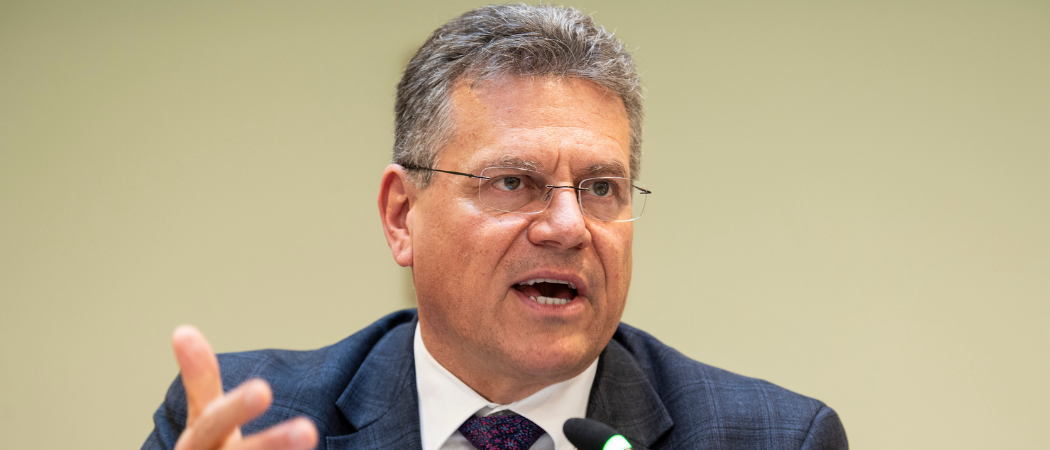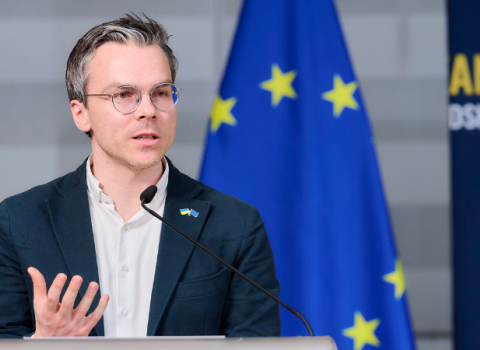A one-stop-shop set up by EIT InnoEnergy aims to simplify access to EU public funding for start-ups and SMEs in the battery industry and act as a catalyst for private investment in the sector

European Commission vice president Maroš Šefčovič. Photo credits: Lukasz Kobus / European Union
EIT InnoEnergy has set up a one-stop-shop to guide start-ups and SMEs across the battery value chain looking for EU public funding.
“Securing EU public funding is a quality seal for many private investors and a key component to continue boosting growth in rapidly growing sectors like batteries,” said Thore Sekkenes, EBA programme director at InnoEnergy. “But start-ups and SMEs often battle with lengthy and complex processes which necessitate time and resource that industry newcomers do not have to spare.”
The service has been created in cooperation with European Commission vice president Maroš Šefčovič who leads the European Battery Alliance (EBA), launched in 2017 by the Commission and EIT InnoEnergy.
The battery industry is a strategic sector and a “key battleground for global competitiveness”, Šefčovič said. “The one-stop-shop service can help enable more efficient deployment of public funds and address financing gaps in several segments of the battery value chain, from upstream activities such as raw and active materials, to recycling of end-of-life products.”
In the pilot phase, the service will focus on facilitating access to the European Innovation Council’s Accelerator fund, the Innovation Fund, the European Investment Bank’s advisory and venture debt instruments, and the European Bank for Reconstruction and Development.
“These are the instruments we work with because we know them well and we think they are the most relevant for start-ups and SMEs,” Baptiste Buet, director of the EU business unit at EIT InnoEnergy, told Science|Business.
If the pilot is successful, the programme could be opened to other sectors. “Our intention is to expand to other programmes – directly managed, indirectly managed, or even managed in member states,” Buet said.
While the service is free, applications will be assessed for their suitability for the programme, although unsuccessful applicants can reapply. Successful applicants will first be shown how to navigate these financing instruments. This will be followed by an assessment stage, including an industry fitness check to ensure a product or innovation is relevant for the battery value chain, and a preliminary assessment of its eligibility for the different funding schemes.
Since the objective is to use public finance as a catalyst for private finance, the business case for a project will also be studied, which Buet believes differentiates the platform from other initiatives.
“We think it’s really important because EU investors […] look at the business case potential. And it’s sometimes a bit overlooked by applicants,” he said. “The public finance strategy has to be part of a wider finance strategy for a company.”
The fitness checks are intended to save time for businesses, but as a knock-on effect they should also provide EU funding schemes with a pipeline of well-qualified projects. The support process is intended to last four weeks.
EIT InnoEnergy has a portfolio of more than 200 companies, and while this does not fall directly in the remit of the new service, businesses will be evaluated for further investment opportunities.
“If through this process there is an opportunity for us to invest, then at the end of this screening process, the one stop shop team would recommend the company to the investment process of InnoEnergy,” Buet said.
One of the European Institute of Innovation & Technology’s (EIT) nine knowledge and innovation communities, EIT InnoEnergy aims to connect academia, industry and investors in support of the energy transition.
Innovators can now apply for the one-stop-shop here.




 A unique international forum for public research organisations and companies to connect their external engagement with strategic interests around their R&D system.
A unique international forum for public research organisations and companies to connect their external engagement with strategic interests around their R&D system.